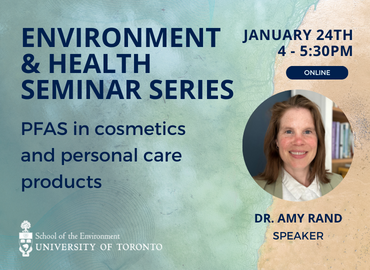- Location
- Webinars will be held via Zoom. Webinar details will be sent to all registered participants.
- Series/Type
- DLSPH Partner & Affiliate Event
- Format
- Online
- Dates
- January 24, 2024 from 4:00pm to 5:30pm
Links
The Environment and Health Seminar Series presents…
‘PFAS in cosmetics and personal care products’
About the Seminar:
Per- and polyfluoroalkyl substances (PFAS) are a diverse group of anthropogenic chemicals used in commercial products and industrial processes. Previous studies have demonstrated their presence in cosmetic and personal care products as ingredients, impurities in the raw material manufacturing process, or degradation products. This presentation highlights our recent study, which attempted to delineate the contributions of these varying PFAS sources to cosmetics and personal care products. We purchased thirty-eight cosmetic and personal care products and analyzed for several PFAS: polyfluoroalkyl phosphate esters (PAPs), perfluorocarboxylic acids (PFCAs), fluorotelomer sulfonic acids (FTSAs), and perfluoroalkyl sulfonic acids (PFSAs) using targeted liquid chromatography tandem mass spectrometry (LC-MS/MS). A subset of these samples was also subjected to non-targeted high-resolution mass spectrometry (LC-HRMS) to measure distinct classes of emerging PFAS. Results from both instruments indicated a predominant presence of PAPs, followed by the persistent and regulated PFCAs. These PFAS were present in almost all cosmetic and personal care products regardless of whether they contained a PFAS-specific ingredient. Furthermore, there were significant correlations between PAP congeners and their corresponding biotransformation products, the FTCAs, FTUCAs, and PFCAs, suggesting that these products arise from PAP transformation at some time during product development. Low levels of other PFAS classes were detected, including compounds previously associated with aqueous film-forming foams (e.g., pentafluorosulfide perfluorooctane sulfonate) or detected in wastewater and human blood (e.g., hydrido-PFCAs). In summary, cosmetics and personal care products can contain a wide breadth of PFAS at extremely high levels, leading to human and environmental exposure.
About the Speaker:
Amy Rand is an Assistant Professor in the Department of Chemistry and Institute of Biochemistry at Carleton University. Prior to joining the faculty at Carleton, she was a postdoctoral fellow within the Comprehensive Cancer Centre at UC Davis and has a Ph.D. in Environmental Chemistry from the University of Toronto. Her primary research interests are studying human exposure sources of environmental contaminants and understanding the mechanisms by which they transform to more active toxicants. She is also interested in how contaminant exposure effects oxidized lipid signaling, and the interaction between different kinds of environmental stressors (e.g., diet) that may alter relationships between contaminant exposure and their toxic response.
